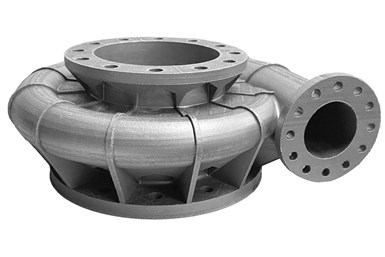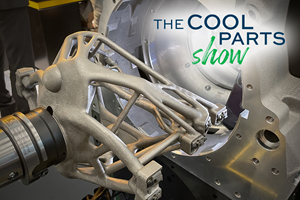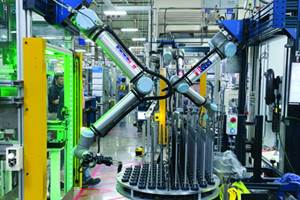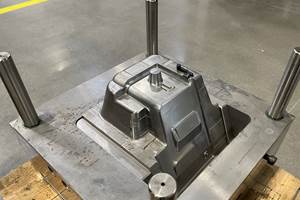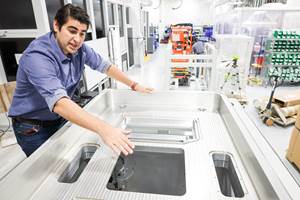Visser Precision Joins Velo3D Global Contract Manufacturing Network
The number of high-performance superalloys certified for additive manufacturing continues to grow as Visser Precision purchases first Velo3D Sapphire printer calibrated for Hanes 214 — with customers in aerospace, defense, automotive and industrial tooling.
A 3D printed volute that can be used in high-temperature oxidizing environments in rocket engines and is indicative of the type of parts that can leverage the material properties of Haynes 214. Photo Credit: Velo3D
Visser Precision, a contract manufacturer serving major industries from the racetrack to outer space, has purchased and received two Velo3D Sapphire printers to expand its additive manufacturing (AM) capabilities for its aerospace customers.
One of the printers delivered is the first Sapphire printer calibrated for Haynes 214 (UNS N07214), a nickel-based superalloy that is now available as a powder option for all Velo3D customers. The other Sapphire printer is calibrated for Inconel 718, which is commonly used in many aerospace and industrial applications for its high strength and corrosion resistance.
Visser Precision has an extensive background in both polymer and metal 3D printing. The company provides its customers in aerospace, defense, automotive and industrial tooling with finished parts that are ready to use in mission-critical applications. Visser purchased its Sapphire printers after a mutual aerospace customer sought to leverage Velo3D’s AM technology for components in its rocket engines.
“In the short time we have worked with Visser Precision, I’ve been very impressed by the thoroughness of their team,” says Zach Murphree, Velo3D vice president of global business development and sales. “With the first Haynes 214 Sapphire in our contract manufacturing network, they will be a great resource for the aerospace industry. We expect many of our existing customers will utilize them for their supply chain needs.”
As an ITAR-registered contract manufacturer, Visser Precision has extensive experience working with some of the most advanced companies in aerospace and defense, two of the industries that have extensively adopted Velo3D’s technology. The company’s full suite of services also includes heat treatment, precision machining and wire EDM. At its Denver facility, Visser Precision also offers its customers functional testing and precision inspection in a climate-controlled environment that is AS9100:D and ISO 9001:2015 certified.
“Our team at Visser Precision is dedicated to providing the best manufacturing technologies to our customers, so we can produce the highest quality parts from the most complex designs,” says Jack Kerr, Visser Precision president. “We view our customers as partners, so when one of them asked us to explore Velo3D’s technology, we did. We were very impressed by the company’s ability to print highly complex part geometries with minimal — and in some cases no — supports.”
Velo3D’s contract manufacturing network enables companies to additively manufacturer parts without having the capital expenditure of a printer. It also gives customers the flexibility to source parts from a variety of suppliers through a distributed supply chain. This is made possible by Velo3D’s fully integrated solution, which includes its Flow print preparation software, Assure quality assurance software and Intelligent Fusion manufacturing process.
Haynes 214 was developed by Haynes International, which specializes in developing new alloys for use in high-temperature environments. The alloy stands apart from other nickel-based alloys by providing enhanced oxidation resistance.
Inconel 718 is one of the most common nickel-based alloys and is used in environments that require superb tensile strength under extreme pressure and heat. Both alloys are extensively used in additively manufacturing parts for aerospace applications, given they are difficult to machine through conventional methods due to their extreme hardness.
- Read how Purdue Researchers are using additively manufactured injector components from Velo3D to create Mach 6 conditions for a ground-testing facility.
- Check out this article about Launcher using additive manufacturing to optimize satellite design with the company depending on Velo3D to 3D print complex rocket compounds for low-cost, small satellite delivery systems.
- Learn more about Velo3D qualifying the high-strength alloy M300 Tool Steel for use in Sapphire printers to improve the lifetime of tooling inserts and enhance manufacturing throughput for automotive manufacturers.
Related Content
3D Printed Cutting Tool for Large Transmission Part: The Cool Parts Show Bonus
A boring tool that was once 30 kg challenged the performance of the machining center using it. The replacement tool is 11.5 kg, and more efficient as well, thanks to generative design.
Read MoreHow AM Enables Cobot Automation for Thyssenkrupp Bilstein (Includes Video)
The shock absorber maker has responded to its staffing shortages through extensive use of collaborative robots. In-house 3D printing makes this possible by providing the related hardware needed to complete the cobot-automated cells.
Read MoreDaimler, OMIC Evaluate Wire-Fed DED for Moldmaking
3D printing a core and cavity on machine from Gefertec, followed by machining, allowed for a complete mold tool to be produced in three days.
Read MoreSeurat: Speed Is How AM Competes Against Machining, Casting, Forging
“We don’t ask for DFAM first,” says CEO. A new Boston-area additive manufacturing factory will deliver high-volume metal part production at unit costs beating conventional processes.
Read MoreRead Next
Crushable Lattices: The Lightweight Structures That Will Protect an Interplanetary Payload
NASA uses laser powder bed fusion plus chemical etching to create the lattice forms engineered to keep Mars rocks safe during a crash landing on Earth.
Read More3D Printed Polymer EOAT Increases Safety of Cobots
Contract manufacturer Anubis 3D applies polymer 3D printing processes to manufacture cobot tooling that is lightweight, smooth and safer for human interaction.
Read MoreProfilometry-Based Indentation Plastometry (PIP) as an Alternative to Standard Tensile Testing
UK-based Plastometrex offers a benchtop testing device utilizing PIP to quickly and easily analyze the yield strength, tensile strength and uniform elongation of samples and even printed parts. The solution is particularly useful for additive manufacturing.
Read More




